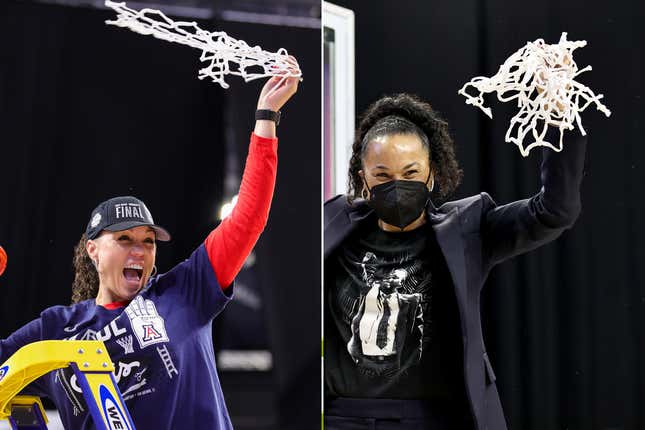
Simply put, the NCAA has been fucking up.
At the onset of March Madness, NCAA officials were forced to apologize for “dropping the ball” after Oregon Ducks forward Sedona Prince put the entire tournament on blast for…well, this:
There isn’t a chance in hell that men would be expected to perform at the peak of their abilities with only a single set of dumbbells and a handful of yoga mats in their weight room. Yet these types of slights are not only unsurprising, but routine in the often unsung world of women’s sports.
The weight room situation would eventually be rectified, but there’s still plenty of gender inequality to address in the NCAA—as evidenced by the disparity in meals being provided to student-athletes, the swag bags, the COVID-19 testing and even the March Madness branding itself.
“When you lay the men’s and women’s championships side by side, as has been made clear over the past weeks, it is pretty self-evident that we dropped the ball in supporting our women’s athletes, and we can’t do that,” NCAA President Mark Emmert told reporters on Wednesday. “That’s a failure that should not exist.”
The situation becomes even more complicated once you add race to the mix. Which is why what South Carolina’s Dawn Staley and Arizona’s Adia Barnes have accomplished this season is so profound.
For the first time in the history of the NCAA women’s tournament, two Black women will serve as head coaches during the Final Four.
In speaking to reporters about this historic feat, Staley expressed her pride in being able to share this accomplishment with Barnes.
“I was cheering for [Barnes] to get it done, not for any other reason besides us being represented at the biggest stage of women’s college basketball,” Staley told reporters after her Gamecocks beat Texas. “That’s because so many Black coaches out there don’t get the opportunity. When [athletic directors] don’t see it, they don’t see it. And they’re going to see it on the biggest stage Friday night; that two Black women are representing two programs in the Final Four, something that has never been done before.”
Prior to pursuing careers as basketball coaches, both Staley and Barnes played in the WNBA. Staley is universally revered as a six-time All-Star and one of the best players in the history of the league, while Barnes won a championship with the Seattle Storm in 2004.
“I know Adia utilizes all of her basketball knowledge as a player and she’s been a coach long enough that she’s not just a suit,” Staley told CNN. “It’s always going to be part player in us and that’s why our players [...] we are so relatable to them. They understand it because it’s coming from a place of ‘We’ve done that. We’re trying to help you get to that place where we can have longevity in our league.’”
Barnes has been instrumental in turning Arizona’s basketball program around. When she returned to her alma mater in 2016, they were the laughingstock of the Pac-12. Now, six years later, the San Diego, Calif., native is leading the Wildcats to her first Final Four appearance as a coach.
On the flipside, Staley has been doing damage in South Carolina. For the third time in six seasons, her Gamecocks are in the Final Four. But despite all of her success, she’s acutely aware that she’s not only fortunate to be in the position that she’s in, but that others deserve a similar opportunity.
“Representation matters,” she said. “It’s nothing against anybody else that lost to us, but when you see two Black women representing in this way, I hope the decision-makers who—because there are a lot of jobs out there that you give Black women an opportunity—not just give them the job. Bring them in. Interview them. If you don’t hire them, let them know why.”
She continued, “There are a lot of people out there that aren’t getting the opportunities that they should because this is exactly what can happen when you give a Black woman an opportunity. Don’t get me wrong, I don’t want people to start bashing me on social media about just hire the most qualified coach. If it was that easy, there would be more Black head coaches in our game.”
On Friday, South Carolina faces off against Stanford, while Arizona meets UConn. And if we’re lucky, we’ll not only have two Black female coaches in the Final Four, but playing for the national championship.

